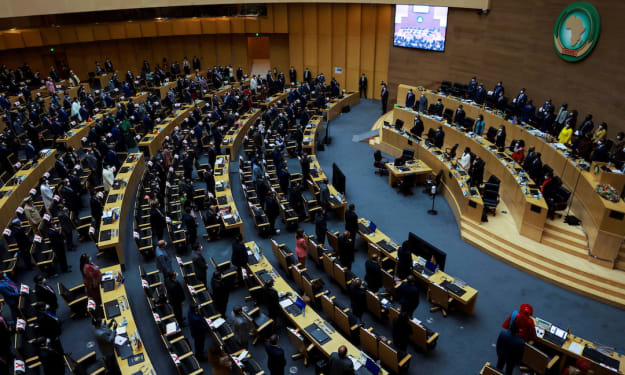Safeguarding the Faithful
Dealing with Rogue Religions and Cults

In this lengthy article, I shall highlight on the sensitive, yet crucial part of diverse societies across the globe in a bid to gain understanding of religion and it’s nature that cuts across the different aspects of societal fabric. For clarity purposes, let us begin by distinguishing between religions and churches from the perspective of nature and structure of both institutions. But first the basics to help us form their portraits in our vortex
Religions: Religions encompass a broader set of beliefs, practices and spiritual traditions shared by a group of people. They often have diverse interpretations and variations, and their followers can be spread across different regions and cultural backgrounds. Religions are inherently decentralized and can be deeply personal, making them challenging to govern in a centralized manner.
Churches: Churches, on the other hand, refer to specific organized religious institutions that gather communities of believers under a common structure and leadership. Churches are more tangible and concrete entities, often with hierarchical systems, established doctrines and formalized practices. As such, they lend themselves more readily to governance.
Religions therefore present challenges in being governed however not in the same way churches can be kept in check for the following reasons.
1. Diversity of Beliefs: Religions encompass a wide range of beliefs, interpretations, and practices. Attempts to impose a centralized governing authority over such diversity would risk stifling the autonomy and freedom of individual believers and religious groups. The inherent personal nature of religious beliefs makes it challenging to enforce a singular governance structure.
2. Lack of Central Authority: Religions often lack a centralized authority figure or governing body that can exercise control over the entire religious community. Instead, they may have multiple sects, denominations or independent spiritual leaders who hold varying degrees of influence within their respective communities.
3. Cultural and Historical Context: Religions are deeply rooted in cultural and historical contexts, shaped by centuries of evolution and adaptation. Governance structures that work for one religious tradition may not be applicable or effective for others due to these unique contextual factors.
4. Separation of Church and State: In many countries, the principle of the separation of church and state ensures that religious institutions maintain independence from governmental control. This separation recognizes the importance of religious freedom and allows churches and religious organizations to operate with a degree of autonomy.
While religions may not be subject to direct governance, they are not except influenced by legal frameworks and societal norms that regulate their activities, such as laws regarding human rights, discrimination, and public safety. Additionally, religious institutions including churches can be subject to governance in areas such as financial management, land ownership and compliance with laws related to non-profit organizations.
In summary, the distinction between religions and churches regarding governance stems from the diverse and decentralized nature of religions, the lack of a centralized authority and the recognition of religious freedom and autonomy. Churches, as specific organized institutions within religions are more amenable to governance due to their formalized structures and hierarchies.
In the recent years, the world has seen a rise of rogue religions and cults that has become a matter of concern across the globe. These groups prey upon the innocent faithfuls, exploiting their belief, vulnerability and trust. The story of "Shakahola" in Kenya serves as a reminder of the importance of vigilance and a poignant example of how individuals can be manipulated by charismatic leaders and predatory groups to the extent of loosing their lives in huge numbers through seclusion with a promise of getting to heaven eventually.
In order to restore integrity in religious practices and combat exploitation within communities, it is both essential and crucial to understand the methods these groups employ and implement strategies that foster and prioritize transparency, ethical conduct and accountability.
By examining the unique challenges faced by each religion we can draw successful examples and develop a comprehensive approach to ensure the faithful are protected from exploitation as well as promote a more responsible and compassionate religious environment.
Understanding Rogue Religions and Cults
Rogue religions and cults often start innocuously, disguising themselves as “More” genuine religious movements. However, their leaders possess ulterior motives, seeking power, control, businesses, get rich quick schemes or personal gains. These groups manipulate and exploit their followers emotionally, psychologically and sometimes financially. They employ persuasive tactics such as isolation from external influences, group-think and fear-based mind control techniques. The recent "Shakahola" story in Kenya exemplifies this, where a self-proclaimed prophet (Makenzie) gained followers by promising miraculous healings and blessings, only to exploit them for gains the legal courts are yet to unwrap.
Promoting Critical Thinking:
Critical thinking is the bedrock of safeguarding against rogue religions and cults. Encouraging individuals to question, analyze and evaluate teachings and practices; these foster a healthy skepticism and safe guards against blind acceptance. Religious institutions should promote open dialogue, engage in intellectual debates and encourage followers to seek multiple perspectives besides belief shortcuts. Education about various religions, including their histories and core principles, can equip individuals with the knowledge to discern between genuine faith and manipulative ideologies.
Creating Ethical Guidelines:
Religious communities must establish and uphold ethical guidelines that protect the rights and well-being of their members. These guidelines should emphasize respect, consent and transparency. Clear boundaries should be set regarding financial contributions, personal autonomy and the handling of sensitive information. Independent oversight committees can be established not just to investigate occurrences but to monitor the conduct of religious leaders and ensure compliance with ethical standards.
Psychological Support and De-Radicalization:
Support systems are essential for individuals who have been affected by rogue religions and cults. Victims may suffer from emotional trauma, cognitive dissonance and social ostracization. Mental health professionals, support groups and counseling services can play a crucial role in providing psychological assistance while facilitating the process of de-radicalization. Governments, religious organizations and NGOs should collaborate to develop comprehensive rehabilitation programs that focus on reintegration, education and empowerment in religious groupings.
Strengthening Ethical Guidelines and Oversight:
Ethical guidelines and oversight mechanisms are crucial in preventing financial exploitation. Religious leaders and institutions should establish clear codes of conduct that outline ethical fundraising practices, prohibit coercive tactics and ensure that financial transactions are conducted with integrity. The establishment of independent oversight bodies, comprising both religious and non-religious professionals, can help enforce these guidelines and investigate any suspected cases of financial misconduct.
Emphasizing Social Welfare and Charitable Initiatives:
Shifting the focus of religious communities towards social welfare and charitable initiatives can help combat financial exploitation. By actively engaging in programs that alleviate poverty, provide healthcare, education and support vulnerable populations. Religious organizations need demonstrate their commitment to serving the greater humanity cause.
This emphasis on social welfare not only encourages responsible financial practices but also helps foster a sense of community and compassion among the faithful.
From a governance perspective, it is dilutional to control the church; however, reinforcing these principles and encouraging active engagement in humanitarian efforts, religious communities can channel their purpose, resources and energy towards shaping the hem and making a positive impact in building the society, reducing the likelihood of financial exploitation.
Education and Financial Literacy Programs:
Promoting financial literacy and education among the faithful is crucial in combating financial exploitation. Religious institutions should not only offer church services but as well workshops, seminars and resources that invite experts and consultants to educate individuals about financial management, the importance of informed giving and how to recognize and avoid fraudulent schemes. By empowering the faithful with knowledge, they can make informed decisions regarding their contributions and become less susceptible to manipulation.
The relationship between the political elite and the church on the other hand can have significant implications for the exploitation of faithfuls. It is important to note that the dynamics of this relationship can vary across different countries and contexts but some common patterns can be observed across all board. Among the most notable ones are the following;
a) Influence and Power: When the political elite aligns closely with specific religious institutions, it can lead to a concentration of power. This concentration of power often results in a lack of checks and balances, which can enable exploitation within the church. The political elite may protect or turn a blind eye to corrupt practices within the church, allowing leaders to manipulate and exploit their congregations under the politician’s shadows.
b) Financial Exploitation: Collaboration between the political elite and the church can lead to financial exploitation. Political figures may provide preferential treatment to churches that support them, granting them tax breaks, access to government funds, or lucrative contracts.
In return, the church may endorse or “Cleanse” the political elite enabling them to use their influence to mobilize support during elections. It is for this reason politicians don’t just visit churches often before elections, but as well insist on speaking at the alters. The financial dependency can result in a culture of exploitation, where church leaders prioritize personal wealth over the well-being of their congregations.
c) Suppression of Dissent: The close relationship between the political elite and the church creates a vulnerability that when exploited leads to the suppression of dissenting voices within the religious community. Political backing can provide church leaders with a shield against criticism or accountability, making it difficult for concerned individuals to voice their concerns or challenge exploitative practices. This stifling of dissent can perpetuate a climate of gagging, fear and enable further exploitation.
d) Diversion of Resources: When the political elite is involved in exploitative practices, resources that could have otherwise been used for the betterment of society, such as healthcare, education, or poverty alleviation, may be diverted for personal or political gain. This diversion of resources can hinder the development of communities and exacerbate the vulnerability of faithfuls and other members of society.
It is important to remember that not all political and religious interactions lead to exploitation. In some cases, the political elite may genuinely support the well-being of their constituents and collaborate with religious leaders for positive social change. However, vigilance, transparency and a commitment to upholding ethical standards are vital to preventing exploitation of the faithful.
In addition to these strategies, fostering media literacy is essential in combating the influence of rogue religions and cults. Many of these groups utilize digital platforms and social media to recruit and indoctrinate individuals. By promoting critical media literacy skills, individuals can learn to discern reliable sources of information, identify propaganda techniques and differentiate between legitimate religious teachings and manipulative ideologies. Educational programs and workshops ought be organized not only raise awareness about the dangers of online manipulation but as well provide tools for positive responsible digital citizenship.
Conclusion:
By implementing strategies that prioritize transparency, education, ethical guidelines and social welfare initiatives, we can bring sanity back to religion and it’s purpose of shaping societies while combating financial exploitation within the faithfuls.
Each religion may face unique challenges; however, the principles of accountability, education and compassion are universally applicable. By working together, religious leaders, clergies, communities, and governing bodies can foster environments that promote integrity, protect the faithfuls and ensure that religious practices align with the core teachings.
NB
The strategic practices shared here are not only limited to the perspective of my article’s focus but can be implemented collaboratively across different boards by various stakeholders, governments, civil society organizations, educational institutions and religious organizations alike, to ensure strengthened societies and communities for the sake of universal global agenda of unity and love despite vast rich and diverse cultures in the world.
Addressing the exploitation of Christians in churches requires a multifaceted approach to Prevent deaths among the faithful who find themselves in churches that already are or have the potential to turn into cults.
About the Creator
Frank Odhiambo
Frank Odhiambo is a seasoned and passionate writer renowned for his compelling and thought-provoking pieces. Global award winner for "Voice of reason" He has established himself as a prominent voice in the world of authors and writers.






Comments
There are no comments for this story
Be the first to respond and start the conversation.